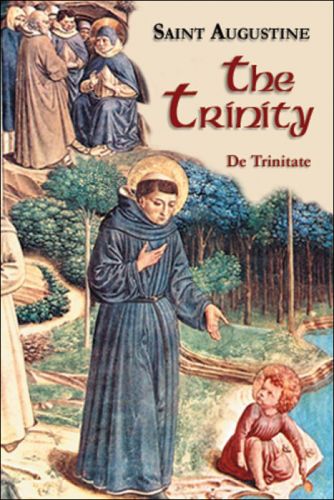A scene from The Canterbury Psalter (12th century)
Blog
Trinitarian Analogies Stir Up the Mind

A trinitarian analogy (“the Trinity is like an egg;” “the Trinity is like a team,” “the Trinity is like the structure of consciousness,” etc.) is a conceptual tool. It’s designed to do something. But what?
I suspect most people would say that what a trinitarian analogy does is construct a kind of rough model of what God is like, in some limited way. Most analogy fans will freely admit trinitarian analogies don’t get you very far, but they at least provide some sort of example of something that is three without ceasing to be one. “Don’t push them too far,” and so on, but they do take a step toward satisfying the mind’s desire to reason analogically from more observable things (egg, apple, group, consciousness, triple point, Hegelian dialectic, Riemann zeta function with infinite sets of sets and a fractalized Cantorian half-gainer) to the great transcendent reality of the triune God. So the idea is that trinitarian analogies are conceptual tools that construct a model, but not a perfect one.
I think this is a relatively recent notion of what trinitarian analogies do. In early Christian thought, when someone like Augustine or Gregory of Nyssa devoted time to exploring trinitarian analogies, they had a different idea of what they were doing. They consistently emphasized the value of analogies for stirring up the mind of the one who made use of them. To ponder an analogy was to construct a conceptual tool in order to open the mind of the one using the analogy. It was a kind of exercise in lifting up the consciousness of the person thinking about God. The tool formed its formulator more than it modelled its object.
Augustine’s De Trinitate is the most elaborate and most influential example of a quest for the trinitarian image in creation. I’ll have to come back and provide quotes and citations later, but Augustine is quite clear from the very first page of the book that his goal is to raise up the minds of his readers from lower realities through higher realities to the highest, and that the upward journey is the point.
So while the first half of De Trinitate covers biblical material and its conceptual analysis, the second half turns a corner and begins proposing trinitarian analogies. Augustine proposes, I think, a couple dozen possible analogies, starting from the most basic and physical up through the most sophisticated and spiritual. As he constructs and discards, constructs and discards, the reader can (a) get the impression that the point of what he is doing is trying to make the best model, and (b) get frustrated that he didn’t do all this work in his prep time and then sit down to write the book after he knew what the answer was. The answer he gets to, by the way (spoiler alert), is that the memory, understanding, and will of the inquiring agent is the best and highest image of the Trinity, but only when considered precisely in the act of coming to know the Father by the Son in the Spirit. So it’s not about a creaturely triangle down here recognizing a resemblance to an uncreated triangle up there. It’s about the soul making its journey into God as its source, way, and goal.
When trinitarian analogies are doing their job, they are stirring up the mind to make room for the revealed truth; they are pushing the analogizer along the path to less and less unworthy possibilities for how to think about what God has made known; they are opening up the receptive faculties of the reader who has heard the word of God but needs to grow deeper and stronger to hear and understand it better.
If you think trinitarian analogies are conceptual tools for modelling divine reality, and you pick up classic trinitarian texts like Augustine’s or Nyssa’s, you might think they are doing the same thing you’re doing, but they’re especially bad at it. In fact, they are doing something different, and they would like to convert you to their project. Trinitarian analogies are conceptual tools for the formation not of theories, but of Christians.
About This Blog

Fred Sanders is a theologian who tried to specialize in the doctrine of the Trinity, but found that everything in Christian life and thought is connected to the triune God.


